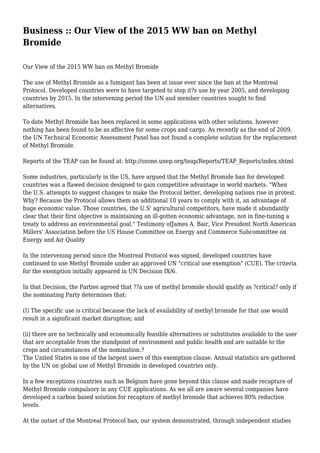
Business :: Our View of the 2015 WW ban on Methyl Bromide
- 1. Business :: Our View of the 2015 WW ban on Methyl Bromide Our View of the 2015 WW ban on Methyl Bromide The use of Methyl Bromide as a fumigant has been at issue ever since the ban at the Montreal Protocol. Developed countries were to have targeted to stop it?s use by year 2005, and developing countries by 2015. In the intervening period the UN and member countries sought to find alternatives. To date Methyl Bromide has been replaced in some applications with other solutions, however nothing has been found to be as affective for some crops and cargo. As recently as the end of 2009, the UN Technical Economic Assessment Panel has not found a complete solution for the replacement of Methyl Bromide. Reports of the TEAP can be found at: http://ozone.unep.org/teap/Reports/TEAP_Reports/index.shtml Some industries, particularly in the US, have argued that the Methyl Bromide ban for developed countries was a flawed decision designed to gain competitive advantage in world markets. "When the U.S. attempts to suggest changes to make the Protocol better, developing nations rise in protest. Why? Because the Protocol allows them an additional 10 years to comply with it, an advantage of huge economic value. Those countries, the U.S' agricultural competitors, have made it abundantly clear that their first objective is maintaining an ill-gotten economic advantage, not in fine-tuning a treaty to address an environmental goal." Testimony ofJames A. Bair, Vice President North American Millers' Association before the US House Committee on Energy and Commerce Subcommittee on Energy and Air Quality In the intervening period since the Montreal Protocol was signed, developed countries have continued to use Methyl Bromide under an approved UN "critical use exemption" (CUE). The criteria for the exemption initially appeared in UN Decision IX/6. In that Decision, the Parties agreed that ??a use of methyl bromide should qualify as ?critical? only if the nominating Party determines that: (I) The specific use is critical because the lack of availability of methyl bromide for that use would result in a significant market disruption; and (ii) there are no technically and economically feasible alternatives or substitutes available to the user that are acceptable from the standpoint of environment and public health and are suitable to the crops and circumstances of the nomination.? The United States is one of the largest users of this exemption clause. Annual statistics are gathered by the UN on global use of Methyl Bromide in developed countries only. In a few exceptions countries such as Belgium have gone beyond this clause and made recapture of Methyl Bromide compulsory in any CUE applications. As we all are aware several companies have developed a carbon based solution for recapture of methyl bromide that achieves 80% reduction levels. At the outset of the Montreal Protocol ban, our system demonstrated, through independent studies
- 2. and field installations that the use of their patented system was the only product in the world that could attain up to 99.9% recovery rates of methyl bromide, and make the methyl bromide available for re-use. This remains so today. The search for a Methyl Bromide replacement has gone on for 15 years and hundreds of millions of dollars has been spent by the UN and member countries, without finding a fully satisfactory solution. The full commercialization of our system for recapture and reuse of methyl bromide in fumigation applications was impacted by the hope of some technological breakthrough in the search for alternatives and the wide use particularly in the US of CUEs. With the intent of the Montreal Protocol being bypassed in some countries by the wide use of exemptions, Aljoud moved on to commercialize its product in a parallel process to recover many other gases used in the industry, where a much stronger legislative framework and requirement was in place. Bio-security, invasive species, and the spread of pathogens in world trade has become of increasing concern, and the inclusion of developing countries in the Montreal Protocol ban of Methyl Bromide scheduled for 2015 is an issue for many countries. The availability of CUEs to developed countries after 2015 has not been addressed by the UN, however it would seem unlikely that member developing countries would not demand a level playing field to the US, and other CUE users in world trade in a post 2015 world. For these reasons, our company views the pending "2015 ban" as an opportunity and not a threat to the use of our patented technology. We believe that both commercial and political interests may become aligned in many countries as 2015 draws closer without a world wide solution to the venting of methyl bromide into the atmosphere. The opportunities may be richer in the developing world that may now need to seek effective solutions that continue to keep their products open to world markets and still meet the spirit of the Montreal Protocol. We would not be surprised to see some industries in the developed world try and use nationals trade barriers against competitors in developing countries who continue to use and vent Methyl Bromide, in order to gain commercial advantage, as they have long held that they have been disadvantaged in the world market place. Our company is reviewing our strategic position in light of the developing political and commercial ?drivers? that we believe will change the landscape for our WW rights and needs and our patented process, as the only one in the world capable of achieving near 100% MB recovery and also reuse it again and again. We are looking for strategic partners who have the right contacts and share our vision. Nathan Hunter CEO Aljoud Company www.aljoudco.net